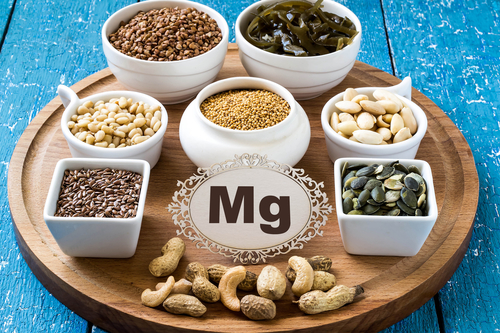One of the biggest challenges to health is managing stress. While it’s impossible to control outside stressors, there are ways to make the body more resilient and less vulnerable to the damage of stress.
One of the best and most natural antidotes to the effect of stress is a clean, whole food diet and the right supplementation. Magnesium (Mg) is one of the most important minerals to supplement to offset stress.
Why is magnesium so important?
This chemical element is critical to healthy body function and responsible for over 300 enzyme reactions in the body. It helps maintain normal heart rhythm, a robust immune system, and good muscle function. A deficiency in this element can lead to minor health complaints like twitches and nervousness as well as serious diseases like hypertension, heart disease, osteoporosis and worsen diabetes.
While magnesium resides in every tissue of the body, bone, muscle and brain tissue has the highest concentration. And it’s estimated that almost half of Americans are deficient in this element because of our processed diet, use of caffeine and alcohol and the natural depletion of this mineral in our soil. Modern-day produce does not contain the same levels of this element as decades ago. So it’s important to eat magnesium rich foods but also take Mg supplements. Foods that are high in this element are nuts, seaweed, shrimp, avocado, greens, garlic, and beans.
Supplementing with magnesium is particularly helpful for people who have difficulties falling asleep, staying asleep or simply relaxing.
Soak it in
Another way to add magnesium in addition to food and supplements is through Epsom salt baths or soaking in hot spring mineral pools. This is one of the best ways to calm tense muscles and quiet an overloaded nervous system. Not only is magnesium absorbed through the skin but the hot water also sooths the soul and melts deeper tension.
A medical tool
Modern medicine also commonly uses magnesium. In the emergency room, it revives people with an irregular, life-threatening heartbeat, or clears bowels before a colonoscopy. It’s also given to pregnant women who suffer from high blood pressure, pre-term labor or seizures.
Are you deficient?
Mild signs of Mg deficiency are tight, stiff or crampy muscles or an inexplicably irritable mood. Other conditions caused by a deficiency of this element are muscle twitches, insomnia, sensitivity to loud noises, kidney stones, constipation, PMS, reflux, obesity, migraines, anxiety, heart palpitations, fatigue, and asthma.
Inflammation and higher CRP levels are linked to a deficiency in this element. This puts you at higher risk for heart problems.
Consuming alcohol, coffee, sodas, or salt as well as excessive sweating, chronic stress, chronic diarrhea, diuretics, antibiotics or parasites can further decrease magnesium levels.
To properly absorb this element, we need to take it high doses with enough vitamin B6, selenium, and vitamin D to help assimilate it.
Balancing magnesium levels in the body requires proper nutrition (replace sodas and processed foods with Mg-rich foods) and practicing relaxation techniques like Epsom salt baths, meditation or yoga. Also, check with your doctor to see if any of your medications may cause Mg loss.
How much magnesium should you take?
People tend to take between 300 mg and 1000 mg of magnesium supplementation daily, depending on need and absorption. It is always a good idea to start low and build up the dosage slowly. A side effect of an overdose of this element is typically diarrhea. Take magnesium glycinate to avoid this. Combine it with the vitamins and minerals mentioned above to increase absorption.
The most absorbable forms of this element are citrate, glycinate, taurate or aspartate. Avoid the poorly absorbed sources like magnesium carbonate, sulfate, gluconate, and oxide.
And remember, make sure to get medical supervision while taking Mg if you suffer from kidney or heart disease.
We recommend taking magnesium glycinate during our 21 day Body Makeover program. By replacing a standard American diet with a clean, blood-sugar balancing diet, the body will lose less magnesium. At the same time, supplementation will replenish levels.
Increased energy, a stable mood, better sleep, fewer aches and pains and a reduction of stress, tension and anxiety are some of the possible benefits of combined detoxification and magnesium supplementation.
To purchase high grade Magnesium supplements, with 20% off every day, with free shipping. Go to this link, enter coupon code: 20% at checkout.


